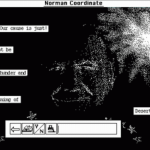2004
From the Oracle of Delphi to the Wizard of Oz, it is clear that "if we attack we will destroy a great empire." The only question that remains, is which one?
R.M. Berry on the recuperation of politicized language, in (and through) the fiction of Marianne Hauser and Lidia Yuknavitch.
Author Lucy Corin opposes the emotionalism of genre fiction to the deeply emotional formalism in the fiction of Harold Jaffe, Patricia Eakins, and Janet Kauffman.
Markku Eskelinen reiterates the bounds of ludology.
Lisette Gonzales reviews a book of essays by Matthew Fuller that examines the way we are programmed by software.
Dave Ciccoricco returns to Stuart Moulthrop, considers Operation Enduring Freedom (2003) in light of Operation Desert Storm (1991), and consults the annals of World War II for a likely source of "Victory Garden," the title of Moulthrop's 1991 network fiction on the Gulf War.
Kiki Benzon on narrative ecology and the "fradulence paradox" of Oblivion.
Andrew Walser introduces a gathering of essays on and by the novelist Joseph McElroy.
"Sedgwick's emphasis is on generating concepts that add to the complexity and inclusiveness of our representations, rather than trying to prescribe the right revolutionary path." Melissa Gregg reviews Eve Sedgwick's Touching Feeling.
Matthew Kirschenbaum rethinks the final section of First Person in light of "five basic strategies for furthering the history of reading."
On Joseph McElroy's Fiction as a lifelong, dramatic investigation of noesis - that abstract but evocative concept rooted in Platonic idealism and redefined(through Phenomenology) as those ineluctable acts of consciousness that constitute reality.
Excerpted from Water Writing - an essay; presented as part of the ebr Critical Ecologies thread; concurrent with a literary Festschrift in honor of Joseph McElroy's lifework.
Paul Gleason on Joseph McElroy's mid-career epic, Women and Men, as contrasted with Don DeLillo's Underworld.
Charles Molesworth on style and spatial form in McElroy's Letter Left to Me, a novel whose poetic making is also an ethical growth.
Gregg Biglieri reads "into" Actress in the House and revels in Joseph McElroy's syntax.
Joseph Milazzo writes about one of the least written about books by Joseph McElroy.
A Review of Malise Ruthven's A Fury for God: The Islamist Attack on America, from Tim Keane, with links to a growing body of writing on terror in ebr.
"The plot offers not so much progress as recurrence, duplication, and reiteration." Flore Chevaillier offers one way to fill in the gaps of Joseph McElroy "Canoe Repair."
Salvatore Proietti straddles science and fiction to offer an interpretation of a McElroy Cyborg.
Yves Abrioux approaches Woman and Men (1987) as an extended novelistic medition on cognition and action.

